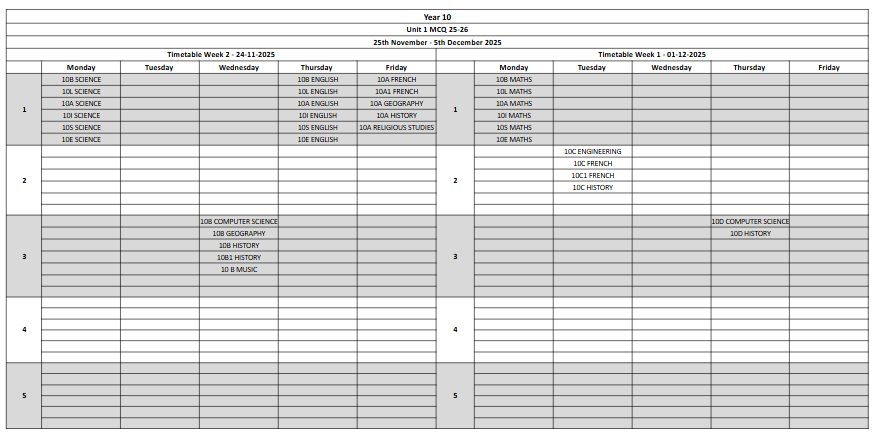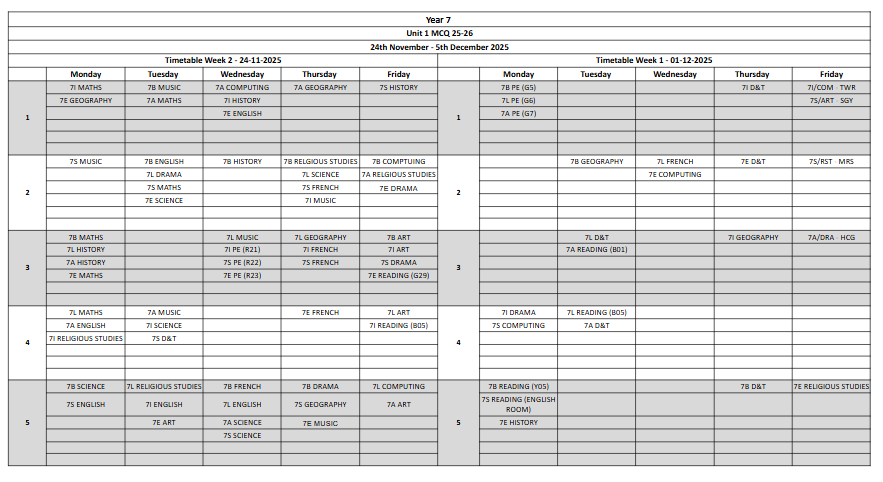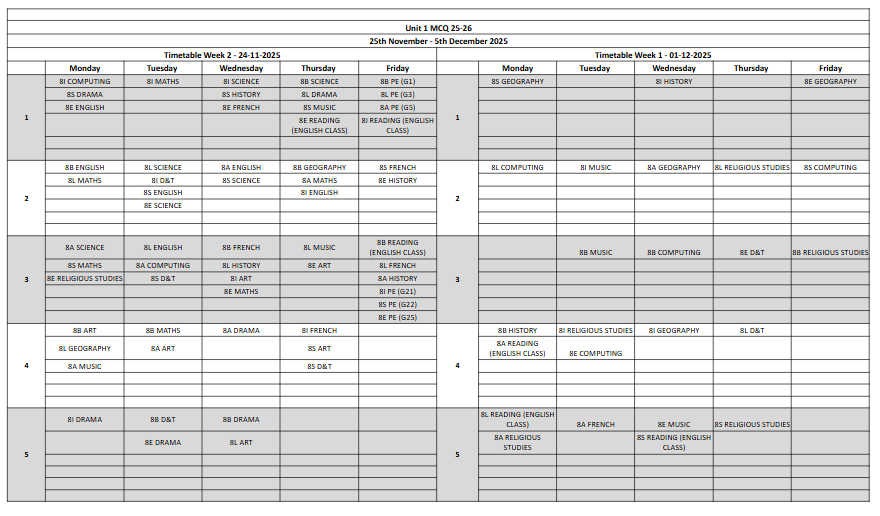how we assess students
At Blaise High School, we are incredibly fortunate to serve students who come to school every single day wanting to learn as much as they possibly can. They do this because they have high aspirations for their future and good character, and we owe it to them to make sure we accurately assess their understanding and progress regularly, so that we can give them feedback and help guide their next steps.
In Lessons, for every student
The most frequent, and arguably most important, way in which we assess students is in their lessons every single day. In the ‘We Do’ phase of our lessons, teachers will use a variety of techniques to ascertain what students do and don’t understand about their new learning, and adapt their instruction accordingly. In the ‘You Do’ phase of our lessons, where students work independently, teachers will assess understanding through live marking, giving students feedback on how to improve when required.
Weekly Knowledge Organiser Quizzes, for Key Stage 3 students
In addition to working hard in lessons, our students also self-quiz with Integrity 6 times each week for homework. They use their knowledge organisers, which have been designed by our expert teachers to include the most important knowledge that students need to know to become successful in each subject. Every student uses the Look, Cover, Write, Check process, which allows them to learn huge amounts of knowledge over time.
It is therefore right that we assess how much knowledge students are acquiring through their homework completion. We do this at Key Stage 3, knowing that when students self-quiz effectively at this stage of their development, they set themselves up to be successful in each subject at Key Stage 4.
Every Friday, Key Stage 3 students complete a Knowledge Organiser Quiz in tutor time, where they are tested on knowledge that they have been learning over the past week for their homework. The quizzes have 12 questions, last for 6 minutes, and are a brilliant opportunity for us to assess how much students are learning, and celebrate this with them.
Here is an example of what a Knowledge Organiser Quiz might look like:
KS3 end of Unit Assessments
As well as assessing students every single lesson, and every week through their Knowledge Organiser Quizzes, we also assess them at the end of each unit (3 times per year), in exam conditions in lessons.
For these end of Unit assessments, students will sit a 30-minute exam for each subject. Each assessment will contain 10 questions testing knowledge from their Knowledge Organiser (just like the Friday Knowledge Organiser Quizzes), and 20 further Multiple Choice Questions that will test knowledge from across the Unit.
We use Multiple Choice Questions in our assessments because we also use them in our lessons. They provide us with brilliant insight into what students really understand and what they still need our help with. They are also easy for students to comprehend and complete, and allow us to create an assessment system where we can accurately assess the understanding of each student in each year group, without taking huge amounts of time out of the curriculum.
Once students have completed Multiple Choice Question assessments for each subject, we then calculate their average percentage score (with English and Maths counting twice), and assign each student a rank. If a student has a rank of 1, this means that they got the highest (or joint highest) average score of any student in the year. If a student has a rank of 37, this means that they got the 37th (or joint 37th) highest average score in their year group – so 36 students scored higher than them. At the end of each Unit, parents will receive a report through the MCAS app giving details of their child’s rank.
At the start of each new Unit, we use the ranks to decide new teaching classes and seating plans.
These end of Unit assessments really matter. Our students want to achieve the highest possible rank they can, and therefore be in the highest possible set they can. Because of this, we ensure that they are well prepared for their assessments. Every day in lessons students will see Multiple Choice Questions. Some of these questions will be the same questions they end up seeing in their assessments. Every Unit, before the assessments begin, each subject will have Curriculum Review lessons, where teachers review some of the most important content from the whole Unit, to ensure students are prepared for their upcoming assessments. Each student will also receive a revision resource – this is a booklet with revision questions that will help students be successful in their assessment.
The message for our students is incredibly clear: if they come to school every day, work hard in every minute of every lesson, self-quiz with Integrity 6 times each week, and use their revision resources before end of Unit assessments, then their hard work will be rewarded with great assessment scores.
Please see the Unit 1 Assessment Timetables below:

Knowledge Organisers and revision resources for each year group will appear below, in addition to the hard copies that students receive – students should be using these to revise for each assessment that they do.
Year 10 End of Unit Exams
Exams in Year 10 are different to assessments at Key Stage 3. Firstly, students will only sit exams in subjects where this is the main method of assessment for the actual qualification (so in Maths, students will sit exams at the end of each Unit in Year 10 because this reflects what happens in the actual GCSE. But in Media, a coursework-based subject, students will not sit end of Unit exams).
For Unit 1 and Unit 2, the exams still take place at the end of each Unit, but they contain GCSE style questions on the content that students have been taught, rather than Multiple Choice Questions. These exams give us a brilliant idea of how each student is progressing, but also allow students to become familiar with how their exams at the end of Year 11 will look.
Like at Key Stage 3, we work hard to ensure that Year 10 students know exactly what they need to do to be successful in their end of Unit exams. They, too, have Curriculum Review lessons, and will receive Assessment Manifests before the end of Unit exams begin. Assessment Manifests are a development of the revision resources at Key Stage 3, where students will receive detailed guidance on exactly what they need to revise for each subject, and how they need to do this.
In Unit 3, Year 10 students will sit full mock exams instead of 45-minute assessments. This is their first opportunity to see exactly what the expected standard at the end of Year 11 looks like, and to impress us with how much they already know. The process for Year 10 mock exams runs in exactly the same way as is described below for Year 11.
Year 11 Mock Exams
Year 11 students will sit two series of mock exams each year, in November and March. This prepares them for public examinations, and ensures we have comprehensive data upon which we can act to ensure every child is able to climb their own personal mountain to the very best universities in the country or careers of their choosing. They are sat in exam conditions in exam locations, and we run mock exam season as we would a public examination series to give students the experience they need to be successful. You will find the assessment manifest and exam timetable below once it has been shared with students. Students will receive their results in school at the end of each unit, and you will be contacted about any set changes.
Just like in Year 10, Year 11 students will receive an Assessment Manifest before each set of mock exams. The assessment manifest will include details on what topics will appear on the exam and a strategy to revise - this could include a link to a website, pages in a revision guide or linked Sparx/Seneca tasks. The assessment manifest also includes details on how the exam is structured and key information on how to complete the exam.





